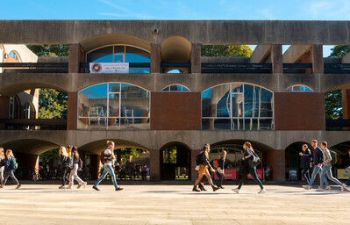Sussex making the case for UK universities
Posted on behalf of: Internal Communications
Last updated: Thursday, 30 January 2025

This academic year has seen Sussex speaking up for higher education in the UK, with a recent important intervention by Mark Clark from the University of Sussex Business School, and extensive media and political engagement by the Vice-Chancellor. In August, Sasha was elected to the Universities UK Board, providing another platform to make the case for change in the higher education funding and policy landscape.
Foundation Years
Last week, Mark Clark, Associate Professor in Management at the Business School published an opinion piece in Times Higher Education* about the fee cap cut for classroom-based Foundation Year subjects. Drawing on data and experience from Sussex, as well as reflecting on the sector as a whole, Mark argued that Foundation Years are a key instrument of social mobility, helping students who are underrepresented in higher education to secure better final degree grades. He predicts that the planned 40% fee cut could leave these students with poor education providers and ultimately worsen inequalities, and that there are better ways to ensure Foundation Years are high-quality.
Mental health and wellbeing funding for universities
In an article in The Times** on 12 January about the increase in university spending on student mental health in the context of financial challenges in higher education, Sasha was quoted as saying: “The pandemic saw severe disruption to the education and personal development of young people, and this has created significant gaps in their academic and social learning. As a result, we are seeing growing numbers of university students reporting mental health and wellbeing problems.
“At Sussex, we offer a wide range of support, but the increasing level of demand on universities’ wellbeing and mental health services requires more government funding, particularly in light of the significant financial challenges that many UK universities face. Universities are providing vital services that the NHS does not offer.
“We cannot wish away the effects of the pandemic, and that is why I have called for both a mental health and wellbeing grant and a Covid premium for universities, to help fund and support the wellbeing and long-term success of our young people, to ensure they are able to reach their potential.”
The proposal for a mental health and wellbeing grant and a Covid premium were in Sasha’s manifesto for higher education change published in 2023. She followed up the article with an interview on Times Radio***, also on 12 January. Copies of the manifesto were shared with senior politicians from political parties ahead of the 2024 general election.
Student numbers and tuition fees
The steep fall in international students affecting UK universities has been a key focus of media activity by the Vice-Chancellor. Sasha spoke about this on a fringe panel organised by the Higher Education Policy Institute at the Labour Party conference in September. In particular, she talked about the impact of the previous government’s hostile rhetoric about international students and immigration in general, as well as the January 2024 policy change preventing international students from bringing dependents with them when they study in the UK. Sasha then spoke about the dependent visa ban and its impact to The Argus in November.
At the Labour Party conference Sasha also discussed the significant challenges that universities and students are facing in relation to (at that time) frozen funding and maintenance support. She highlighted in meetings with politicians and ministers including, the Secretary of State for Education, that higher education and research make a vital contribution to society but urgently need a new funding model, and the reversal of the dependent visa ban. The same issues were raised by the University staff who attended other political conferences in the autumn. Sasha returned to the funding issues in an interview with the BBC, the story being covered on the BBC news website (the broadcast interview is no longer available on catchup) and in a Higher Education Policy Institute (HEPI) blog in October.
In November, the government announced a rise in tuition fees and maintenance loans in line with inflation. Separately, Sasha told The Argus that whilst she welcomed the increase in the tuition fees by inflation in 2025/26 she noted that a one off increase does not provide a long-term solution to the funding of higher education.
Sasha was also interviewed on Sky News alongside Amira Campbell, President of the National Union of Students, when the tuition fee rise was announced, calling it a welcome but modest uplift. Here Sasha expanded on the citizens’ assembly idea proposed in her 2023 manifesto, and explained that it should bring together prospective students, parents, teachers, taxpayers, and employers, as well as universities themselves, to explore how higher education could be adequately and sustainably funded. The Vice-Chancellor also reiterated the importance of the government reversing the ban on taught international students bringing their families with them whilst they study in the UK.
It is also the case that the expected increase in income for the University from the tuition fee rise will be more than offset by the rise in employers National Insurance contributions from April 2025 and the possible impact of the cut in Foundation Year fee cap for classroom-based subjects. Sasha has written to all Sussex MPs to highlight the additional challenges faced by the sector due to the increase in National Insurance contributions. She has also written to MPs to explain the current serious financial sustainability challenges facing Sussex and many other universities that have led to the need for our current Voluntary Leavers’ Scheme.
*Staff can login to Times Higher Education (THE) by signing up using your Sussex email.
** A subscription is required to read the Times article directly but you can access subscription newspapers via the University’s subscription to Nexis.
***It is free to set up an account to listen to the interview on Times Radio.

